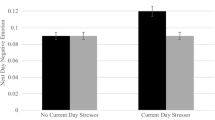Abstract
The present study investigated the proposal that increased laughter can serve to moderate the affective impact of negative life events. Community participants kept a record of their actual frequency of laughter for a 3-day period, and completed a measure of stressful life events each evening. Current levels of positive and negative affect were also obtained in the morning and evening of each day. A series of simple correlations, computed on a daily basis, provided little evidence for any direct relationships between amount of daily laughter and either positive or negative affect. Instead, more complex moderator analyses revealed that greater negative affect was clearly associated with a higher number of stressful life events, but only for those individuals with a lower frequency of actual laughter. In contrast, and in support of a stress buffering hypothesis, it was found that individuals with a higher frequency of laughter did not show greater levels of negative affect as stressful life events increased. When considering positive affect, it was found that only males showed a significant moderating effect of laughter. For males who laughed more frequently, a greater number of stressful life events was associated with higher levels of positive affect. These findings are discussed in terms of several possible mechanisms which may account for the moderating effects of laughter on affect, including the use of cognitive appraisals and emotion-focused coping strategies.
Similar content being viewed by others
REFERENCES
Aiken, L. S., & West, S. G. (1991). Multiple regression: Testing and interpreting interactions. Newbury Park, CA: Sage.
Brantley, P. J., Cocke, T. B., Jones, G. N., & Goreczny, A J. (1988). The Daily Stress Inventory: Validity and effect of repeated administration. Journal of Psychopathology and Behavioral Assessment, 10, 75–81.
Brantley, P. J., Waggoner, C. D., Jones, G. N., & Rappaport, N. B. (1987). A Daily Stress Inventory: Development, reliability, and validity. Journal of Behavioral Medicine, 10, 61–74.
Deaner, S., & McConatha, J. (1993). The relation of humor to depression and personality. Psychological Reports, 72, 755–73.
Fry, W. F. (1994). The biology of humor. Humor: International Journal of Humor Research, 7, 111–126.
Graeven, D. B., & Morris, S. J. (1975). College humor in 1930 and 1972: An investigation using the humor diary. Sociology and Social Research, 59, 406–410.
Korotkov, D., & Hannah, T. E. (1994). Extraversion and emotionality as proposed superordinate stress moderators. Personality and Individual Differences, 12, 395–397.
Kuiper, N. A., & Martin, R. A. (1993). Humor and self-concept. Humor: International Journal of Humor Research, 6, 251–270.
Kuiper, N. A., & Martin, R. A. (1998). Is sense of humor a positive personality characteristic? In W. Ruch (Ed.), The “sense of humor”: Explorations of a personality characteristic (pp. 159–178) (Humor Research Series). Berlin, Germany: Mouton de Gruyter.
Kuiper, N. A., Martin, R. A., & Dance, K. A. (1992). Sense of humor and enhanced quality of life. Personality and Individual Differences, 13, 1273–1283.
Kuiper, N. A., Martin, R. A., & Olinger, L. J. (1993). Coping humor, stress, and cognitive appraisals. Canadian Journal of Behavioral Science, 25, 81–96.
Kuiper, N. A., Martin, R. A., Olinger, L. J., Kazarian, S. S., & Jette, J. (in press). Sense of humor, self-concept, and psychological well-being in psychiatric inpatients. Humor: International Journal of Humor Research.
Kuiper, N. A., McKenzie, S. D., & Belanger, K. A. (1995). Cognitive appraisals and individual differences in sense of humor: Motivational and affective implications. Personality and Individual Differences, 19, 359–372.
Kuiper, N. A., & Olinger, L. J. (1998). Humor and mental health. In H. Friedman (Ed.), Encyclopedia of mental health, (Vol. 10). San Diego, CA: Academic Press.
Larsen, R. J., Diener, E., & Emmons, R. A. (1986). Affect intensity and reactions to daily life events. Journal of Personality and Social Psychology, 51, 803–814.
Martin, R. A. (1989a). Techniques for data acquisition and analysis in field investigations of stress. In R. W. J. Neuteld (Ed.), Advances in investigations of psychological stress (pp. 195–234). New York: Academic Press.
Martin, R. A. (1989b). Humor and mastery of living: Using humor to cope with the daily stresses of growing up. In P. E. McGhee (Ed.), Humor and children's development: A guide to practical applications (pp. 135–154) New York: Haworth Press
Martin, R. A. (1996). The Situational Humor Response Questionnaire (SHRQ) and Coping Humor Scale (CHS): A decade of research findings. Humor: International Journal of Humor Research, 9, 251–272.
Martin, R. A., & Dobbin, J. P. (1988). Sense of humor, hassles, and immunoglobin A: Evidence for a stress-moderating effect of humor. International Journal of Psychiatry in Medicine, 18, 93–105.
Martin, R. A., & Lefcourt, H. M. (1983). Sense of humor as a moderator of the relation between stressors and moods. Journal of Personality and Social Psychology, 45, 1313–1324.
Overholser, J. (1992). Sense of humor when coping with life stress. Personality and Individual Difference, 13, 799–804.
Provine, R. R. (1993). Laughter punctuates speech: Linguistic, social and gender contexts of laughter. Ethology, 95, 291–298.
Rim, Y. (1988). Sense of humor and coping styles. Personality and Individual Difference, 9, 559–564.
Ruch, W. (1996). Measurement approaches to the sense of humor: Introduction and overview. Humor: International Journal of Humor Research, 9, 239–250.
Ruch, W., & Deckers, L. (1993). Do extraverts “like to laugh”? An analysis of the Situational Humor Response Questionnaire (SHRQ). European Journal of Personality 7, 211–220.
Santiago, R. A., & Bernstein, B.!L. (1996). Affiliation, achievement and life events: Contributors to stress appraisals in college men and women. Personality and Individual Differences, 21, 411–419.
Watson, D., Clark, L. A., & Tellegen, A. (1988). Development and validation of brief measures of positive and negative affect: The PANAS scales. Journal of Personality and Social Psychology, 54, 1063–1070.
Author information
Authors and Affiliations
Rights and permissions
About this article
Cite this article
Kuiper, N.A., Martin, R.A. Laughter and Stress in Daily Life: Relation to Positive and Negative Affect. Motivation and Emotion 22, 133–153 (1998). https://doi.org/10.1023/A:1021392305352
Issue Date:
DOI: https://doi.org/10.1023/A:1021392305352



